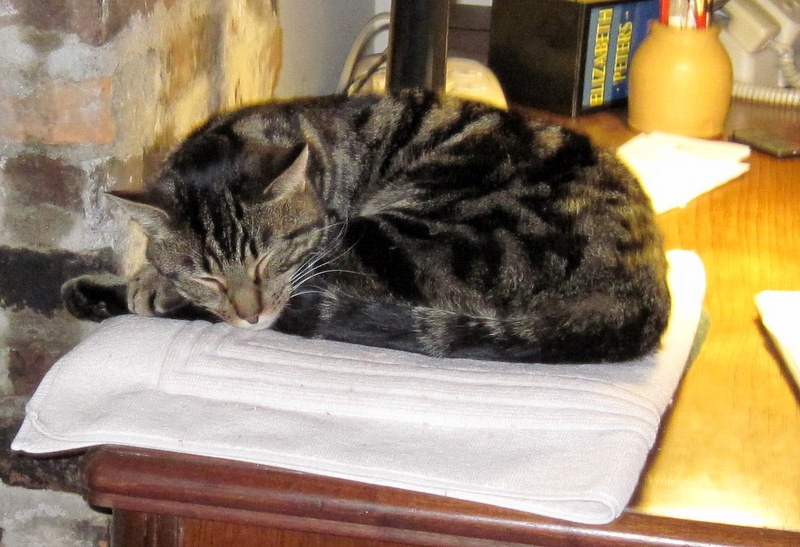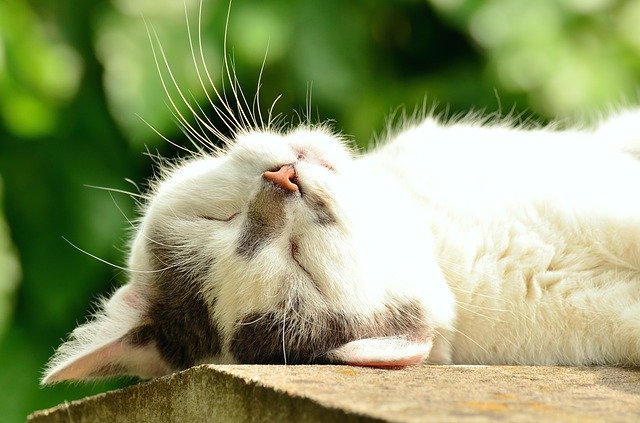 About this time last year I wrote a December commentary that began with me lamenting how much I needed to do and how little time I had to do it. And how, like others, I assumed the resident animals wouldn’t hinder me in this regard. Quite the contrary, they would display exemplary behavior and extraordinary support.
About this time last year I wrote a December commentary that began with me lamenting how much I needed to do and how little time I had to do it. And how, like others, I assumed the resident animals wouldn’t hinder me in this regard. Quite the contrary, they would display exemplary behavior and extraordinary support.
Needless to say, that didn’t work out as planned and it probably won’t this year either.
In last year’s commentary, I also mentioned the high cost of sleep deprivation during this time of year. A study conducted by University of California at Berkeley neuroscientist Matthew Walker and his colleagues provides insights into just how high those costs might be.
 What struck me about the study is that we’re not talking about a long-period of sleep deprivation like those morally iffy interrogation techniques some use on real or imaginary terrorists. Those in a test group of healthy young college students were only deprived of sleep for one night. The next day the researchers did brain scans of them and a comparable group of young people who slept the night before. During the scans, the subjects were shown a series of threatening or disturbing pictures. The brains of the people who had slept perceived the pictures and their responses to them in context. However the brains of those in the sleep-deprive group sent panicked signals to the most primitive areas of the areas of the brain. In addition to experiencing primitive fight-or-flight responses, the sleep-deprived students also exhibited the extreme mood swings commonly seen in those with mental illness. These included laughing wildly one minute and crying hysterically the next.
What struck me about the study is that we’re not talking about a long-period of sleep deprivation like those morally iffy interrogation techniques some use on real or imaginary terrorists. Those in a test group of healthy young college students were only deprived of sleep for one night. The next day the researchers did brain scans of them and a comparable group of young people who slept the night before. During the scans, the subjects were shown a series of threatening or disturbing pictures. The brains of the people who had slept perceived the pictures and their responses to them in context. However the brains of those in the sleep-deprive group sent panicked signals to the most primitive areas of the areas of the brain. In addition to experiencing primitive fight-or-flight responses, the sleep-deprived students also exhibited the extreme mood swings commonly seen in those with mental illness. These included laughing wildly one minute and crying hysterically the next.
 Sleep quantity and quality has become an increasingly hot scientific topic. Those who previously perceived chronic sleep-deprivation as a symptom of a wide range of ailments increasingly questioned whether they got it backwards. The illness wasn’t caused by a lack of sleep; the lack of sleep was causing the illness.
Sleep quantity and quality has become an increasingly hot scientific topic. Those who previously perceived chronic sleep-deprivation as a symptom of a wide range of ailments increasingly questioned whether they got it backwards. The illness wasn’t caused by a lack of sleep; the lack of sleep was causing the illness.
Because a fair number of sleep studies are conducted on animals as well as people, they also can teach us a lot about the role sleep plays in animal health. And if quality sleep plays a critical role in maintaining human physical and mental health, its role in the prevention or treatment of animal physical and behavioral health cannot be ignored.
This brings me to restorative sleep. Think of restorative sleep as comparable to those times when a  business shuts down to the public for critical cleaning and and any needed repairs. Some might argue that a certain amount of business might be lost during that period. On the other hand, working in a soiled environment with limited supplies or malfunctioning lights, plumbing, or electrical services would undermine the business’s ability to give its full attention to its work and customers. Those who found themselves working under such circumstance soon learn that the costs of taking this approach quickly outweigh any benefits.
business shuts down to the public for critical cleaning and and any needed repairs. Some might argue that a certain amount of business might be lost during that period. On the other hand, working in a soiled environment with limited supplies or malfunctioning lights, plumbing, or electrical services would undermine the business’s ability to give its full attention to its work and customers. Those who found themselves working under such circumstance soon learn that the costs of taking this approach quickly outweigh any benefits.
Human and non-human animal brains need restorative sleep to learn. Animals with problem behaviors need restorative sleep to convert all those exercises and other changes made in human-animal interactions in their waking hours into something real and repeatable. They need it to do all the brain restructuring necessary to replace problem behaviors with more acceptable ones.
Their brains can’t do that if there are all kinds of distractions that prevent restorative sleep. Like some  people under similar circumstances, dogs and cats who feel insecure in their homes may never sleep soundly. Part of their brains are always on the alert for a sound, scent or other stimulus that might signal a problem. Or they replay their stressful days in dreams during which they routinely twitch, paddle, whimper or bark. If they feel responsible for protecting their people, some of these animals may be more stressed when left alone so no chance of restorative sleep there either. However, the only times other animals may get any restorative sleep is when their people are gone. And as increasing data suggests, that quality sleep deprivation is taking its toll on physical as well as behavioral health.
people under similar circumstances, dogs and cats who feel insecure in their homes may never sleep soundly. Part of their brains are always on the alert for a sound, scent or other stimulus that might signal a problem. Or they replay their stressful days in dreams during which they routinely twitch, paddle, whimper or bark. If they feel responsible for protecting their people, some of these animals may be more stressed when left alone so no chance of restorative sleep there either. However, the only times other animals may get any restorative sleep is when their people are gone. And as increasing data suggests, that quality sleep deprivation is taking its toll on physical as well as behavioral health.
So this holiday season, resist the temptation to buy your dog or cat some clever remote device that allows you to wake them up and babble at them when you’re bored out of your skull at work. Resist the temptation to buy a remote-controlled device that not only allows you to wake them up and talk to them whenever you’re in the mood, but also fire treats at them. I can’t think of a better way to sabotage restorative sleep than a device like that! First you wake up the sleeping animal, then you reward the animal for waking up. Given the critical role restorative sleep plays in learning, that doesn’t seem like a sound learning strategy. Nor do I see the advantage of doing this to an animal who’s already jumpy in the owner’s absence .

While focusing on communicating calmness either by our own behavior or routine human-animal interactions such as grooming or massage cost us nothing, the benefits to those animals with behavioral and health problems may be priceless. And ensuring sufficient restorative sleep for your animals as we;; as yourself is another priceless gift that will benefit the animals in your life. 
Needless to say, that didn’t work out as planned and it probably won’t this year either.
In last year’s commentary, I also mentioned the high cost of sleep deprivation during this time of year. A study conducted by University of California at Berkeley neuroscientist Matthew Walker and his colleagues provides insights into just how high those costs might be.
Because a fair number of sleep studies are conducted on animals as well as people, they also can teach us a lot about the role sleep plays in animal health. And if quality sleep plays a critical role in maintaining human physical and mental health, its role in the prevention or treatment of animal physical and behavioral health cannot be ignored.
This brings me to restorative sleep. Think of restorative sleep as comparable to those times when a business shuts down to the public for critical cleaning and and any needed repairs. Some might argue that a certain amount of business might be lost during that period. On the other hand, working in a soiled environment with limited supplies or malfunctioning lights, plumbing, or electrical services would undermine the business’s ability to give its full attention to its work and customers. Those who found themselves working under such circumstance soon learn that the costs of taking this approach quickly outweigh any benefits.
business shuts down to the public for critical cleaning and and any needed repairs. Some might argue that a certain amount of business might be lost during that period. On the other hand, working in a soiled environment with limited supplies or malfunctioning lights, plumbing, or electrical services would undermine the business’s ability to give its full attention to its work and customers. Those who found themselves working under such circumstance soon learn that the costs of taking this approach quickly outweigh any benefits.
Human and non-human animal brains need restorative sleep to learn. Animals with problem behaviors need restorative sleep to convert all those exercises and other changes made in human-animal interactions in their waking hours into something real and repeatable. They need it to do all the brain restructuring necessary to replace problem behaviors with more acceptable ones.
Their brains can’t do that if there are all kinds of distractions that prevent restorative sleep. Like some people under similar circumstances, dogs and cats who feel insecure in their homes may never sleep soundly. Part of their brains are always on the alert for a sound, scent or other stimulus that might signal a problem. Or they replay their stressful days in dreams during which they routinely twitch, paddle, whimper or bark. If they feel responsible for protecting their people, some of these animals may be more stressed when left alone so no chance of restorative sleep there either. However, the only times other animals may get any restorative sleep is when their people are gone. And as increasing data suggests, that quality sleep deprivation is taking its toll on physical as well as behavioral health.
people under similar circumstances, dogs and cats who feel insecure in their homes may never sleep soundly. Part of their brains are always on the alert for a sound, scent or other stimulus that might signal a problem. Or they replay their stressful days in dreams during which they routinely twitch, paddle, whimper or bark. If they feel responsible for protecting their people, some of these animals may be more stressed when left alone so no chance of restorative sleep there either. However, the only times other animals may get any restorative sleep is when their people are gone. And as increasing data suggests, that quality sleep deprivation is taking its toll on physical as well as behavioral health.
So this holiday season, resist the temptation to buy your dog or cat some clever remote device that allows you to wake them up and babble at them when you’re bored out of your skull at work. Resist the temptation to buy a remote-controlled device that not only allows you to wake them up and talk to them whenever you’re in the mood, but also fire treats at them. I can’t think of a better way to sabotage restorative sleep than a device like that! First you wake up the sleeping animal, then you reward the animal for waking up. Given the critical role restorative sleep plays in learning, that doesn’t seem like a sound learning strategy. Nor do I see the advantage of doing this to an animal who’s already jumpy in the owner’s absence .
While focusing on communicating calmness either by our own behavior or routine human-animal interactions such as grooming or massage cost us nothing, the benefits to those animals with behavioral and health problems may be priceless. And ensuring sufficient restorative sleep for your animals as we;; as yourself is another priceless gift that will benefit the animals in your life.